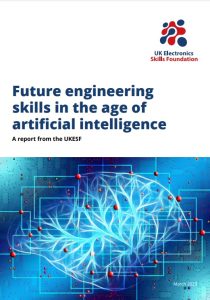 Compiled following wide industry consultation, the report concludes the UK’s role is being held back by a significant skills shortage, for what is described as a vital multi-billion-pound global industry.
Compiled following wide industry consultation, the report concludes the UK’s role is being held back by a significant skills shortage, for what is described as a vital multi-billion-pound global industry.
The report states:
“All [previous studies] focus on the broader aspects of working on and with AI. To date, there hasn’t been any research specifically about the future skills needed to create and engineer the technology to delivery future AI capability. The UK Electronics Skills Foundation (UKESF) has now undertaken this research and their findings are presented in this report.”
Headline findings included 95% of those surveyed saying a shortage of skills in the external labour market concerned their companies, 84% saying they had plans to up-skill and re-skill their workforce, and 73% envisaged that they would need different technical skills at their company or organisation.
Also, 67% of respondents said they would be focusing on wider AI-related skills, in the broadest sense.
It’s main conclusion was a clear need for government-level focus on a broader AI engineering skill set, which will be required in the future, to ensure there are the AI systems graduates needed by the ‘deep tech’ sector.
“AI systems will underpin important advances such as autonomous transportation, intelligent large-scale infrastructures and smart personalised healthcare,” said Stew Edmondson, CEO of UKESF. “Our motivation for undertaking this research was to ensure the engineering and ‘systems’ aspects weren’t neglected in the ongoing discussion about AI skills.”
You can read the the full report online, via the organisation’s Skills Advocacy page.. It was compiled with support from TechWorks.
In terms of the survey, quantitively, the survey was completed by 131 individuals from 119 different companies and organisations. Almost half (44%) of the companies were SMEs with less than 100 employees. Qualitatively, the UKESF also interviewed 30 industry stakeholders working in senior roles.
AI
What is AI, exactly, in this context? The report summarises as follows:
“It can be considered that AI is a broadly used term that can cover linguistics, sensor data analysis or image analysis. For instance, large AI frameworks will use data from LiDAR , radar, camera and sonar sensors to train autonomous, self-driving vehicles. There is also facial recognition, where frameworks are trained with pictures of faces in order to count heads and recognise specific people.”
“For applications such as the Internet of Things, AI can look more like digital signal processing (DSP). Indeed, well-established DSP chip IP suppliers have ported their cores to AI implementations in pattern recognition. This can use DNNs or signal envelopes with rule-based logic to provide local decision-making capabilities. This means the vast majority of microprocessor and microcontrollers that ship will include some form of AI in hardware.”
UKESF
UKESF – an educational charity established in 2010 – works to tackle the national skills shortage for electronics, especially semiconductor design and manufacture. It works collaboratively with major companies and leading universities on a range of education Electronics-focused activities, projects and teacher training.
See also: UKESF, Apple partner for ‘Girls into Electronics’ programme
 Electronics Weekly Electronics Design & Components Tech News
Electronics Weekly Electronics Design & Components Tech News



